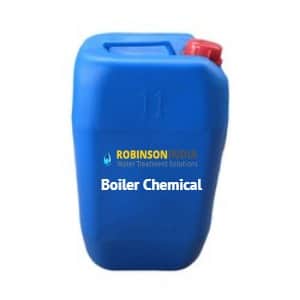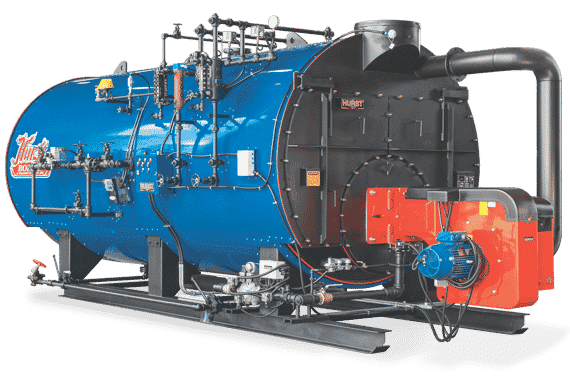Boiler Water Chemicals
As well as being a service company Robinson India manufactures and supplies a range of high-quality boiler water treatment chemicals all over India and export customers. Our chemicals are suitable for land, marine & heritage water boilers.
A badly treated steam boiler is a potential bomb, so getting the feed water quality and boiler water chemistry correct is critical and that means using tried and tested boiler water treatment chemicals.
A complete water treatment programme for a steam boiler will usually include a chemical oxygen scavenger, alkalinity builder and polymer sludge conditioner and, depending on the application, may also incorporate a phosphate treatment and a condensate line treatment.

Boiler Water Chemical Treatment
The treatment and conditioning of boiler feed water must satisfy three main objectives:
- Continuous heat exchange
- Corrosion protection
- Production of high quality steam
The following provides a guide on some of the more common chemicals that are used in boiler water chemical treatment.

Oxygen Scavengers
Oxygen scavengers are designed specifically to reduce the amount of dissolved oxygen and oxides in the water. When you introduce a chemical oxygen scavenger to your boiler water, you’ll be able to remove any residual oxygen from the feed water, protect the boiler from harmful chemical reactions, and reduce corrosion within the feed tank and return lines. Tannin chemicals and sulphite chemicals have proven to be particularly effective oxygen scavengers. If you decide to use sodium sulphite, this oxygen scavenger will act quickly and is particularly beneficial for low-pressure applications.
If you want to make sure that your boiler doesn’t corrode, it’s highly recommended that you make use of oxygen scavengers.
Alkalinity Builders
Alkalinity builders are designed specifically to raise the pH level of the water that they are placed in. All you need to do to determine the pH level of your boiler water is to test it with a pH sensor. If the pH levels have dipped too far, alkalinity builders will help you increase the alkalinity of the water. When you increase the alkalinity of your boiler feed water, you will be able to protect the feed line and hot well from acid corrosion. The amount of this chemical that you require all depends on how low the pH level is in your feed water.
The most common alkaline solutions for boiler water include sodium hydroxide and potassium hydroxide. You can typically purchase these products with a 25 percent concentration or a 50 percent concentration. If you need to significantly increase the amount of alkalinity in your feed water, a 50 percent solution could be the most effective option for you.
Amines
Amines are neutralizing chemicals that are able to keep the condensate pipe on a boiler from corroding. Condensate water from a steam boiler can be highly corrosive to piping, which can damage your boiler and cause you to make expensive repairs to fix the issue.
When these amines are placed into your boiler water, they will increase the condensate pH, which heavily reduces the possibility of corrosion. Low pH within condensate piping is known to cause high amounts of corrosion, which can lead to both condensate leaks and steam leaks. Once this chemical has been applied to the water in your boiler, you’ll be provided with increased boiler reliability, cleanliness, and protection.
Anti-Scaling Agents
Anti-scaling agents are used to enhance the dispersive properties of any conditioning products that are being used in your boiler water. An anti-scaling agent is typically comprised of a blend of polymers and phosphates.
These chemicals act as softening agents in order to minimize the buildup of scale in your boiler. Scaling can be a significant problem for boilers because of how it causes the boiler to be much less efficient. When harder impurities like magnesium salt and calcium start to increase in your boiler water, they will eventually become concentrated, which means that they will adhere to the tubes and other surfaces in your boiler.
External & Internal Boiler water chemical treatment
The two types of treatment for boiler water include external treatment and internal treatment. With external treatment, the impurities are reduced or removed entirely from the water once the water has been taken outside of the boiler.
As for the internal treatment of boiler water, this process calls for the conditioning of the impurities within the water, which means that the water is softened with softening chemicals like sodium phosphate and soda ash. The main purpose of internal treatment is to properly reduce hardness, sludge, and scavenge oxygen in the feed water.
External Treatment
External treatment is the reduction or removal of impurities from water outside the boiler. In general, external treatment is used when the amount of one or more of the feed water impurities is too high to be tolerated by the boiler system in question. There are many types of external treatment (softening, evaporation, deaeration, membrane contractors etc.) which can be used to tailor make feed-water for a particular system.
The water treatment facilities purify and deaerate make-up water or feed water. Water is sometimes pretreated by evaporation to produce relatively pure vapor, which is then condensed and used for boiler feed purposes. Evaporators are of several different types, the simplest being a tank of water through which steam coils are passed to heat the water to the boiling point. Sometimes to increase the efficiency the vapor from the first tank is passed through coils in a second tank of water to produce additional heating and evaporation. Evaporators are suitable where steam as a source of heat is readily available. They have particular advantages over demineralization, for example, when the dissolved solids in the raw water are very high.
Internal Treatment
Internal treatment is the conditioning of impurities within the boiler system. The reactions occur either in the feed lines or in the boiler proper. Internal treatment may be used alone or in conjunction with external treatment. Its purpose is to properly react with feed water hardness, condition sludge, scavenge oxygen and prevent boiler water foaming.
Internal treatment can constitute the unique treatment when boilers operate at low or moderate pressure, when large amounts of condensed steam are used for feed water, or when good quality raw water is available. The purpose of an internal treatment is to:
1) react with any feed-water hardness and prevent it from precipitating on the boiler metal as scale;
2) condition any suspended matter such as hardness sludge or iron oxide in the boiler and make it non-adherent to the boiler metal;
3) provide anti-foam protection to allow a reasonable concentration of dissolved and suspended solids in the boiler water without foam carry-over;
4) eliminate oxygen from the water and provide enough alkalinity to prevent boiler corrosion.
Connect with us
Hey ! We are looking forward to start a project with you
Whether you have questions related to RO Plant, DM Plant, ETP, STP, or service & maintenance of existing water treatment plants. Our Team is always ready to provide solutions for all your needs.
Email :
Call us
+91 9811483920
+91 8178276169
Office Address
B-2/314, Tara nagar, Old Palam Road, Near Ram Mandir, Dwarka Sec-15, New Delhi. Pincode : 110078
Business Hours
Mon to Fri : 8 AM to 6 PM
Saturday : 9 AM to 4 PM
Sunday : Off